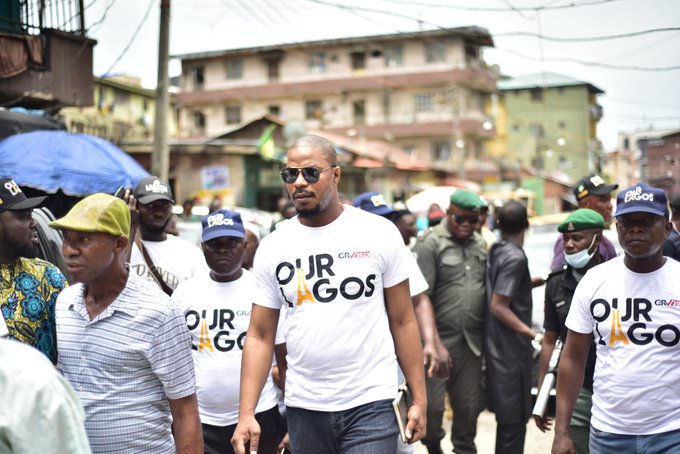In response to the recent announcement of a minimum wage increase to ₦85,000 by the Lagos State government, former Labour Party governorship candidate, Gbadebo Rhodes-Vivour, has criticized the new wage as insufficient for workers in Lagos, calling for a minimum of ₦100,000.
Rhodes-Vivour commended the Lagos State Governor, Babajide Sanwo-Olu, for the wage increment but stressed that it falls short of addressing the realities of living in Nigeria’s economic hub.
The cost of living in Lagos, he argued, has skyrocketed due to inflation and the rising prices of basic needs, making it nearly impossible for the average Lagosian worker to make ends meet on ₦85,000 per month.
Lagos, often referred to as Nigeria’s commercial capital, is known for its high cost of living compared to other states in the country. From rent to transportation and food, Lagos residents face significant financial challenges, making even basic survival a struggle for low-income earners.
In his statement, Rhodes-Vivour painted a grim picture of life for many Lagosians. He explained that the current minimum wage is barely enough to cover the essential costs of housing, transportation, and feeding, let alone other needs like healthcare and education.
“The recent rise in the minimum wage to ₦85,000 is praiseworthy, but it falls well short of addressing the particular cost-of-living issues that Lagos workers face,” he said.
One of the critical issues raised by Rhodes-Vivour is the high cost of housing in Lagos. Rental prices in the city are some of the highest in Nigeria, with even small apartments in areas like Ikeja, Lekki, and Surulere costing far more than what many workers can afford.
“Lagos has the highest rental costs overall in Nigeria, and with minimal investments in social housing programs, it is difficult for workers earning ₦85,000 to afford decent accommodation,” Rhodes-Vivour noted.
Additionally, he highlighted the fact that Lagos is home to the highest intra-city public transportation costs in the country. Workers who commute long distances from areas like Ikorodu or Badagry to the island or the central business district often spend a large portion of their earnings on transportation alone.
“For many workers, the cost of transportation takes a huge chunk out of their salaries. Combine that with rent and the cost of food, and there’s little left to sustain a family,” he explained.
Another significant challenge facing Lagosians is the cost of feeding. Rhodes-Vivour pointed out that Lagos ranks as the second most expensive city to feed in Nigeria, which adds to the financial burden on residents. Prices of essential commodities like rice, bread, and cooking oil have risen sharply in recent years, making it difficult for low-wage earners to afford nutritious meals.
“The cost of food in Lagos is extremely high, and this wage increase does not reflect that reality,” he said.
Rhodes-Vivour also criticized the Lagos State government for its budgetary allocations, which he said have not resulted in significant improvements in the lives of Lagos residents. He argued that while the government touts its large budgets, these have not translated into better living conditions for the people.
“It’s crucial to note that over 70% of Lagos State’s operating revenue comes from taxes, with PAYE (Pay As You Earn) contributing 45%. This means the state’s wealth, which the governor seems to take all the credit for, is primarily generated by citizens’ hard work,” he said.
He questioned the tangible benefits that Lagosians receive in return for this substantial contribution, listing several key areas of concern such as public education, infrastructure, and social housing.
“What tangible benefits do Lagosians receive in return for this significant contribution? Do their children have access to quality public education? Is there an efficient and affordable public transportation system? Are the roads well-maintained? Is social housing readily available?” Rhodes-Vivour asked.
Rhodes-Vivour’s critique extended to the state’s infrastructure, particularly the quality of public roads and the availability of affordable housing. He emphasized that while workers contribute significantly to the state’s revenue through taxes, they do not see corresponding improvements in services that directly impact their lives.
“Despite the contributions Lagosians make to the state’s revenue, the roads are still in poor condition, and there is a lack of social housing to support the growing population,” he said.
He urged the Lagos State government to channel more funds into programs that will have a direct impact on the quality of life for residents, particularly in areas such as housing, healthcare, and education.
In light of these challenges, Rhodes-Vivour recommended that the Lagos State government consider raising the minimum wage to ₦100,000. He argued that this amount would be more reflective of the actual cost of living in Lagos and would help workers support their families.
“We need to push for a minimum wage that reflects the realities of living in Lagos. ₦85,000 is simply not enough. A more realistic figure would be ₦100,000, which would allow workers to at least cover their basic needs,” he said.
Rhodes-Vivour concluded by urging the Lagos State government to take the concerns of workers seriously and prioritize their welfare, adding that the prosperity of the state is built on the hard work of its residents.

